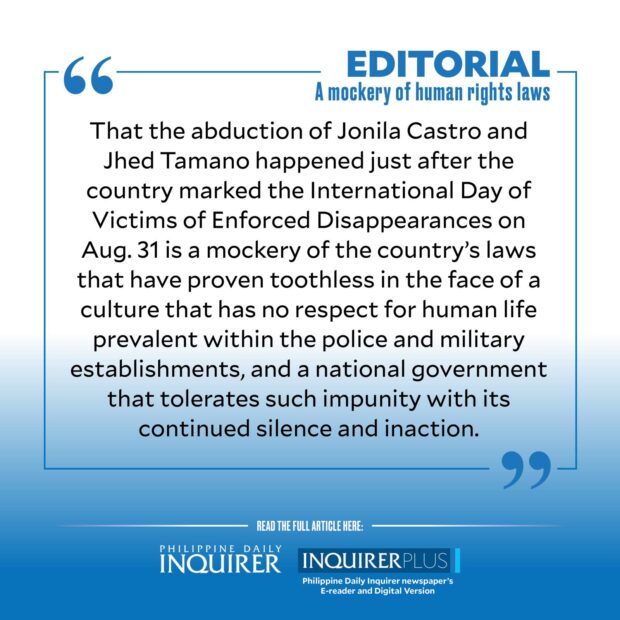A mockery of human rights laws
 The reported abduction of two environmental activists early this month is an alarming indication that the human rights situation in the Philippines, so deplorable under the previous administration that the International Criminal Court had gotten involved, continues to deteriorate. Just how much worse it could get is a common fear unless the highest level of government firmly reins in state agents believed to be behind such disappearances.
The reported abduction of two environmental activists early this month is an alarming indication that the human rights situation in the Philippines, so deplorable under the previous administration that the International Criminal Court had gotten involved, continues to deteriorate. Just how much worse it could get is a common fear unless the highest level of government firmly reins in state agents believed to be behind such disappearances.
Why would anyone abduct environmental advocates—two young women at that? Jonila Castro, 21, and Jhed Tamano, 22, members of the Akap-Ka Manila Bay environmental group opposing reclamation activities in Manila Bay, were reportedly preparing for relief operations for communities affected by reclamation activities, when four armed men forced them into a vehicle on the evening of Sept. 2 in Barangay Lati, Bataan province.
Civil society and church groups that conducted a fact-finding investigation raised concerns that government agents could be behind the abduction because one of the two women had reportedly been harassed and Red-tagged prior to the incident.
Castro’s mother Roselie also said the police had been asking the families to sign a “document purportedly saying that our daughters are doing something wrong.” The police and military were quick to deny involvement in the disappearance of the two women, with Philippine National Police spokesperson Col. Jean Fajardo claiming that “the parents themselves have an idea as to where their children are.”
But this twist does not wash in the face of the tepid response and noncooperation of the Bataan police, according to the families. Civil society groups which conducted the fact-finding mission questioned how the police handled the investigation, and whether they had secured for evidence the CCTV footage in the area. The groups added that when they went with the Castro family to file a missing person report, they were “not accommodated by the [Orion] police officers.”
Even as police claimed that the families know their children’s whereabouts, shouldn’t it be incumbent on the PNP to exert every effort to surface the missing women to erase any doubt that this is another desaparecido case involving them or the military? Shrugging off the abduction does not help clear the climate of impunity brought about by the rising number of disappearances under the current government.
According to Commission on Human Rights (CHR) chair Richard Palpal-latoc, 11 activists have gone missing since President Marcos took office in 2022. These include rights activists Gene Roz de Jesus and Dexter Capuyan who were allegedly abducted by military forces on April 28, and community organizers and University of the Philippines (UP) Manila alumna Patricia Cierva and Cedric Casaño who were reportedly captured by the military in Cagayan on May 18.
In July, the Court of Appeals ordered the Armed Forces of the Philippines and the PNP to present De Jesus and Capuyan, after granting the petition for a writ of habeas corpus filed by their families. Yet as in the cases of activist Jonas Burgos, who was abducted in 2007, and UP students Karen Empeño and Sherlyn Cadapan who disappeared in 2006, even the court’s orders and the conviction of high-ranking military generals in the Empeño-Cadapan case, have not helped find the missing activists.
It does not help that the present administration has put significant amounts of confidential and intelligence funds for surveillance of alleged communist sympathizers even in our schools. The Department of Education’s recent statement that 16 schools in Metro Manila are engaged in recruitment for the New People’s Army has not only shown its misplaced priorities in the face of the poor quality of education in public schools, but is also perpetuating an atmosphere of distrust.
The CHR is right in calling on the Marcos administration to “take decisive action before another case of missing human rights defenders is reported.” The President’s mere passing mention of human rights in his second State of the Nation Address is not enough to stem the continued acts of harassment, abduction, and killing of activists and militants, which were associated with his father’s martial law regime and the bloody war on drugs under former president Rodrigo Duterte.
The CHR has pointed out that Republic Act No. 10353 or the Anti-Enforced or Involuntary Disappearance Act of 2012, penalizes any form of extrajudicial seizure of individuals, while our Constitution and the Universal Declaration of Human Rights guarantee the right to life, liberty, and security of all citizens.
That the abduction of Castro and Tamano happened just after the country marked the International Day of Victims of Enforced Disappearances on Aug. 31 is a mockery of the country’s laws that have proven toothless in the face of a culture that has no respect for human life prevalent within the police and military establishments, and a national government that tolerates such impunity with its continued silence and inaction.




















